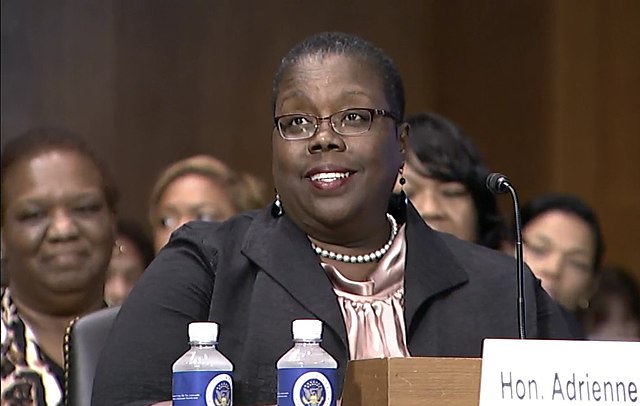
Adrienne Nelson, the federal judge who’s taken over a case overseeing the Oregon State Hospital, is a former public defender who’d become the first Black justice of the Oregon Supreme Court before receiving a federal appointment from President Joe Biden.
Her predecessor on the case until March, Michael Mosman, was a former prosecutor who was appointed by former President George W. Bush.
What the two have in common? A failure to be persuaded by Marion County's efforts to steer management of the state’s primary psychiatric institution in a different direction — one that county officials contend would better address public safety as well as the care of people experiencing mental illness.
Marion County has chafed under patient discharge deadlines set by Mosman and has tried to assert more influence over the flow of patients in and out of the Salem-based psychiatric facility.
Now, after repeatedly striking out, Marion County is again appealing to the 9th U.S. Circuit Court of Appeals. This time, it has brought in outside help: a nationally prominent lawyer known as a conservative champion in issues including campaign finance regulation and abortion access. Mother Jones magazine once called Jim Bopp, Jr. a “GOP super-lawyer,” He recently participated in a successful effort to keep former President Donald Trump on the Colorado ballot after being removed by the state Supreme Court.
In an interview, the Indiana-based attorney told The Lund Report he has a longstanding interest in disability rights and decided to help Marion County after reviewing the case — in which, he said recent federal rulings have turned things “upside down.”
New ruling sparks second county appeal
On April 4, Nelson, who took over the litigation overseeing Oregon State Hospital admissions, denied Marion County’s request for an expanded role in the long-running litigation — and similarly denied a crime victims’ group.
Nelson concluded that her predecessor's federal order limiting how long most patients can be housed at the state hospital takes priority over victims’ rights as well as the burdens Marion County had cited due to its status as home to the psychiatric facility.
Nelson took over the decades-old case from Mosman under the District Court’s case management plan. Her ruling shows that, for now, she’s unwilling to buck past orders that tried to increase access to limited beds at the psychiatric facility.

In December, Mosman extended for another year his controversial order that set discharge deadlines for state hospital patients accused of crimes who need treatment in order to aid and assist in their defense. By opening up beds, the order is intended to protect patients’ constitutional rights by affording them treatment instead of jail.
Earlier this year, Marion County and the victim’s group filed motions asking Nelson for “intervenor” status, which would give them increased ability to file motions and present evidence. A previous such motion by Marion County had been denied.
The crime victims include three people who were assaulted outside of a Salem school by Charly Velasquez-Sanchez, who was later committed to the hospital and discharged after meeting the time limits. Represented by the Oregon Crime Victims Law Center — a group cofounded by tough-on-crime activist Steve Doell and led by former prosecutors, among others — they argued that they should be granted intervenor status because of their interest in upholding victims’ rights as protected by the Oregon Constitution.
However, Nelson disagreed. “This argument does not pass constitutional muster,” she wrote in her order.
Nelson concluded that Mosman’s earlier order takes precedence over the Oregon Constitution’s protections for victims rights. She noted in her order that the Oregon Constitution specifies that its protection for victims does not diminish “a criminal defendant’s rights under the Constitution of the United States.”
Jane Vetto, the county’s counsel, had argued in a filing for intervenor status that Marion County’s community restoration program was being overwhelmed and is unequipped for the needs of discharged state hospital patients — echoing concerns raised by Multnomah County employees and officials outside of court.
Some discharged patients, Vetto wrote, end up in the county jail, where they do not receive treatment and take up resources.
Before being reassigned, Mosman ruled on March 6 that his order mandating treatment timelines overrides a conflicting order from a state court judge who sought to commit a defendant to the state hospital for longer periods.
“These people are getting thrown out of the hospital by federal court order, when they still need care and treatment — and returned to a jail where they can never be tried for the criminal charges. What are they supposed to do?"
Outpatient services cited
Citing the U.S. Constitution’s supremacy clause, Mosman struck down Marion County Circuit Court Judge Audrey Broyles’ order committing Velasquez-Sanchez to receive outpatient services at the state hospital while being lodged at the county jail. By then, Velasquez-Sanchez had received six months of services at the state hospital, the maximum amount under Mosman’s timeline, but still was unable to aid and assist in his defense.
Despite Mosman’s ruling, Broyles on March 12 denied a motion by Velasquez-Sanchez’s lawyer to dismiss his charges. In a sharply worded order, she wrote that “the only reason that the defendant is in this situation is because of Judge Mosman’s order.” She asked state appellate courts for guidance on “how to navigate this impossible situation without sacrificing public safety and the defendant’s rights.”

Attorneys for advocacy group Disability Rights Oregon and Metropolitan Public Defender opposed granting Marion County intervenor status. In a withering brief, they wrote that the state hospital has never offered outpatient services and does not have the capacity to do so.
Among other objections, the attorneys wrote that the county’s arguments were both delayed and contradictory. They pointed out that the county complained it was being burdened with keeping discharged state hospital patients in jail while also trying to keep Velasquez-Sanchez in jail.
“Marion County could never have a ‘legally protected interest’ in the unconstitutional confinement of detainees found unable to aid and assist,” they wrote in the brief.
Nelson agreed, writing, “This contradiction cannot be reconciled and is insufficient to adequately explain the County’s delay in seeking to intervene in this case.”
The same day Nelson denied both requests to intervene, Vetto filed a notice that she would appeal to the 9th Circuit Court of Appeals. The notice stated the county was appealing both Mosman’s treatment timelines, his order that they take precedence over a conflicting state judge orders and that the case be referred to mediation.
The following day, Vetto filed another notice of appeal aimed at Nelson denying the county intervenor status.
Nelson on Monday ordered that Vetto’s response to Disability Rights Oregon’s filing be struck from the record because it was filed late.
Conservative lawyer will join appeal
Bopp, in a telephone interview, told The Lund Report he was invited to join the case by individuals including Marion County Commissioner Colm Willis. He reviewed the case and considered the county’s cause “meritorious,” he said, adding that he has a long history of advocating for disability rights.
The Oregon State Hospital litigation, he said, started off in 2002 as intended to “ensure that the people with mental illness … received the kind of care that they needed.”
More recently, he said, judicial rulings in the case have “done a 180, prohibiting appropriate care and treatment if it goes beyond certain artificial deadlines. I don’t understand it.
“These people are getting thrown out of the hospital by federal court order, when they still need care and treatment — and returned to a jail where they can never be tried for the criminal charges. What are they supposed to do? Live out their life in jail, in this limbo created by the federal court order that prohibits rehabilitative care for these people?” he continued. “I mean the world's turned upside down all of a sudden … It seemed so unjust.”
It’s unclear whether the latest Marion County appeal will be joined with its earlier appeal to the 9th Circuit. That appeal is currently scheduled for oral argument on May 8 before a three-judge appellate panel.
On the same day, a separate appeal filed by Legacy Health and other hospital systems challenging a Mosman ruling will also go to oral arguments before the same panel. The hospital systems argued that the Oregon Health Authority had violated the civil rights of mental health patients by failing to provide them adequate mental health treatment options, only to have Mosman dismiss the case.
Recently, Legacy informed the appeals court that it will be represented by another high-profile lawyer, former Oregon Supreme Court Justice W. Michael “Mick” Gillette.
(Nick Budnick contributed reporting for this article)
You can reach Jake Thomas at [email protected] or via twitter.com @jakethomas2009.
Mr. Bopp is quoted as saying he is an advocate for disability rights. The vast majority of disability rights organizations would take issue with that claim.